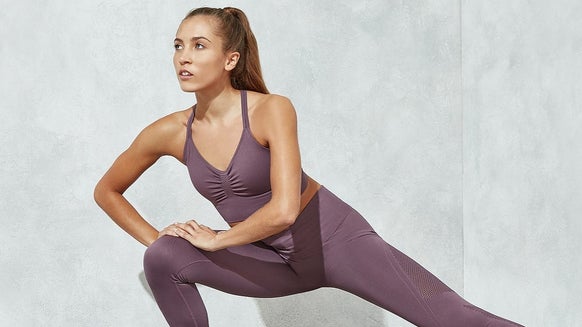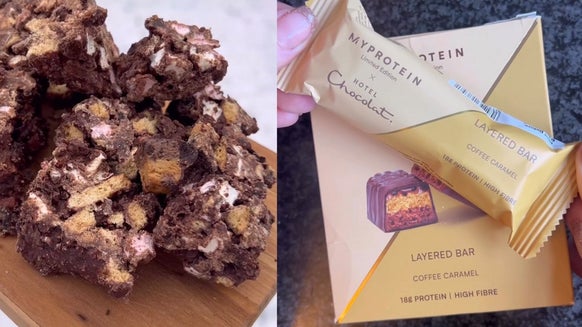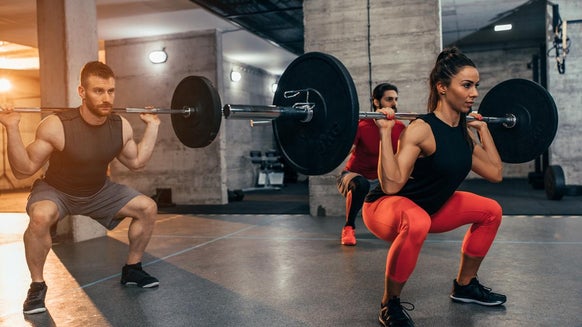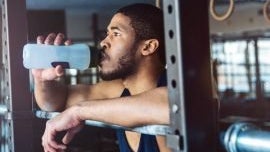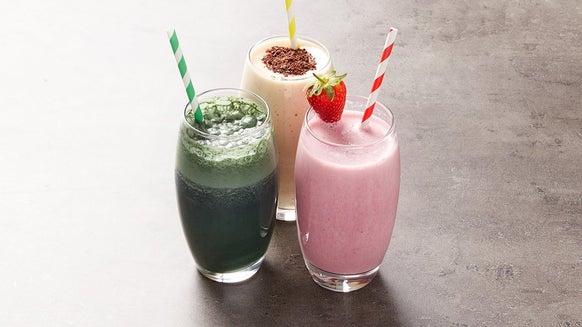
At Myprotein’s Labs Live event, Lucy Davis and Ben Haldon sat down with Sioban O’Hagan, Ryan Terry and Lex Griffin to hear what eating intuitively means to them and how it helps to shape their approach to health and fitness.
This exclusive talk was a great opportunity to hear from bodybuilders and fitness influencers who incorporate intuitive and mindful eating into their daily practices.
Jump To:
What is Intuitive Eating?
It’s a phrase that’s thrown around often when we speak about health and nutrition — but what does it actually mean?
According to the National Eating Disorders Association, intuitive eating refers to a non-dieting approaching to changing your eating habits. It’s about trusting your body to make food choices that feel good for you, without judgement or labels that are built up by diet culture.
It’s important to remember that intuitive eating is a 10-step framework, and you must be qualified to speak on it. When Ryan, Lex and Siobhan are speaking about this eating plan, they are focusing on eating intuitively and mindfully rather than on this specific 10-step plan.
How does bodybuilding fit into intuitive eating?
Ryan Terry is a successful bodybuilder, yet he achieves these results without tracking calories. “I found early on in my career that it wasn’t enjoyable for me to be so specific on calorie counting and became a chore and monotonous. It couldn’t be sustainable for 365 days a year. Some people can and some people can’t, and I was a guy who lost the enjoyment when it came down to counting every calorie I was eating.”
Instead of counting calories when he diets for a show, which is about 12-16 weeks out of the year, Ryan weighs his food so he can keep track of grams but not calories. “I go on how I feel in the mirror, how I look in the mirror, how my pumps are when I’m training, how long the pumps last for while I’m training and my mental state. If I’m fatigued and all those types of factors when I’m dieting.”
When Ryan comes off his prep, he eats well but will still eat meals with his family and is not as strict with his food.
Eating mindfully
Sioban O’Hagan has done a 180 on how she views mindful eating. Sioban used to track significantly. In preparation for a bodybuilding show in 2017, Siobhan learned to love tracking calories and it helped her to get shredded before she stepped on the stage. “I loved tracking calories as I found it gave me so much freedom. I just always loved Nutella, and I wasn’t willing to cut it out. Counting calories really helped to be in a calorie deficit the right way to get shredded and be on stage.”
However, Siobhan found that she couldn’t maintain that strict control of her calories. “Once I started training for performance, I started doing CrossFit and Muay Thai, I just decided I didn’t care what I looked like anymore, and I wanted to actually listen to my hunger levels rather than looking at the numbers.”
So how did Siobhan switch her mindset? “You can’t just switch off. Initially I would still think of the numbers … I think you’ve always got that knowledge in your head.” Despite struggling with seeing past the numbers, Siobhan decided to concentrate on her hunger levels.
Her best piece of advice is to try and not let herself get too hungry, as she found this was when she made impulsive decisions with her food. She always suggests not going past the point of fullness as well, to keep you at steady level so you can make intuitive decisions throughout the day.
“Slow down. That’s the big thing. I just slowed down and going ‘yes I do want the Nutella but I also want to be lean so what do I really want?’ And sometimes that is the Nutella.” Siobhan confirms that it takes practice to get to this point but that being able to make the right decision for your body is the ethos behind mindful eating.
Fitness and food
Lex Griffin chatted about how his opinion of diet culture has changed because of his intense prep for bodybuilding. Rather than living off turkey and water in the lead up to competition, Lex eats a variety of food groups.
Instead of copying the diet that bodybuilders usually follow, being strict down to every last calorie, Lex wanted to concentrate on “the science behind macros” and allowing himself a varied diet of everything from ice cream to fruit.
Lex suggested other diets that don’t involve really strict calorie counting. “Water retention levels can rise and fall depending on how late you finish eating one night or how early you finished eating the previous night which is where intermittent fasting can come into play.” Eating in a certain timeframe can make your body look more consistent and can help you feel comfortable in how you look without being too restrictive on calories.
Lex suggests that focusing on macros instead of calories can “remove guilt from food because when you do measure macros, you realise ‘I can eat chocolate if I want to eat chocolate’ and you can utilise that many carbs and that many fats and you eat it guilt free, knowing it’s within my allowance.”
Is dieting hard?
Benji shot some hard facts out about dieting — around 80% of people regain the weight that they have lost through dieting. For perpetual dieters, 30-35% of people who diet will become perpetual dieters and a further 20-25% of those will develop an eating disorder, which is on the biggest causes of death in the UK.
Is intuitive eating a way to break this cycle?
Siobhan spoke about her experience coaching women and suggested that leaning to count calories can lead to making intuitive decisions. Women tend to “think in clean and dirty or good and bad foods, and I want them to learn to cut down or bulk up certain foods for different motivations rather than thinking good food or bad food.”
Lex suggested that no matter what eating plan you follow, the most important thing is consistency. “This way, if you mess up, it’s not going to affect everything you’ve done up until that point. You can’t gain loads of weight really quickly, just like you can’t get shredded really quickly.”
Take Home Message
Learning how to listen to your body can be a long journey but ultimately, it’s something that can completely change your relationship with food.
It’s important to remember balance and consistency when looking at your eating habits — sustainability is key.
Got some more time?
READ THESE NEXT:





